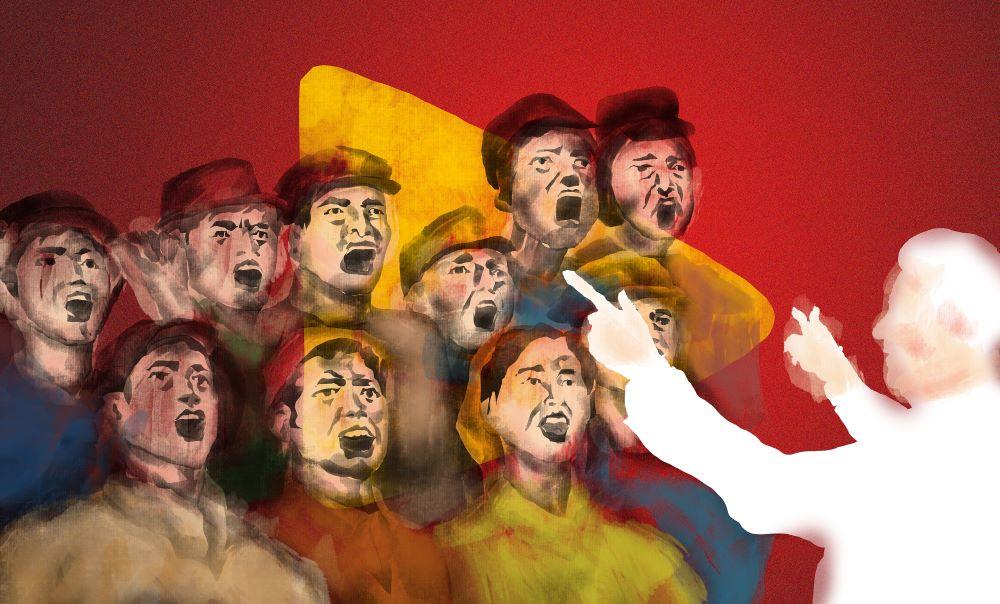Singing the CCP’s tune: foreign influencers and China’s propaganda strategy
Posted By Fergus Ryan, Matt Knight and Daria Impiombato on November 27, 2023 @ 06:00

In 2020, as the Covid-19 pandemic swept across the globe, China faced international scrutiny over its draconian control measures and the nature and origin of the pandemic. The Chinese Communist Party saw an urgent need to push back as it scrambled to uphold its global standing.
The CCP’s propaganda machine sprang into action, launching campaigns through party-state media to underscore the effectiveness of the CCP’s leadership in navigating the crisis. ‘Wolf warrior’ diplomats and media workers, acting in accordance with Xi Jinping’s directives to boost propaganda work, took to global platforms like Twitter and Facebook, presenting a narrative of resilience, capability and control amid chaos. This portrayal emphasised the ‘advantages’ of China’s unique political and social system, turning scrutiny into an opportunity for praise.
Yet, it wasn’t merely the seasoned hands of party-state media or the fiery voices of diplomats that painted this rosy image. A relatively new set of players had stepped onto the stage: foreign influencers. This group of non-Chinese nationals residing in China and carefully nurtured by the CCP over the years has become an integral part of the choir, harmonising with the ‘main melody’ (主旋律)—the party’s term for themes or narratives that promote its values, policies and ideology. Our new ASPI report, Singing from the CCP’s songsheet: the role of foreign influencers in China’s propaganda system [1], explores how this process works.
In an era where digital content is king, the CCP has recognised the power that foreign influencers wield compared to more traditional communication channels. Boasting millions of followers in China and overseas, especially on platforms such as TikTok, YouTube and Twitter, the CCP has identified, harnessed and actively developed foreign influencers as unique propaganda assets. It’s become a symbiotic relationship—aligned influencers flourish under the CCP’s regulated social media ecosystem, while the party uses their popularity to bolster its legitimacy both domestically and internationally.
By leveraging the supreme control that it has over the information environment in China, the CCP can eliminate discordant foreign voices and establish a monoculture of foreigners who, when talking about matters of political importance to the party, adhere to the ‘main melody’. Instead of a cacophony of competing views and voices, the party hopes to corral foreign influencers with party-state media workers masquerading as influencers as well as state-approved ethnic-minority influencers into a harmonious choir.
This isn’t just about promoting Chinese culture or achievements; foreign influencers are being guided, both overtly and subtly, to defend the CCP’s stance on sensitive issues. From territorial disputes to human rights concerns, the narratives pushed by many of these influencers are increasingly aligned with the CCP’s ‘main melody’. The CCP’s tentacles of influence extend even to international students at Chinese universities, building them into a ready-made army of young, social-media-savvy influencers.
Taking a closer look, the CCP has used influencers to complement its geopolitical objectives. In particular, Russian influencers in China have been harnessed as part of the CCP’s strategic goal of strengthening bilateral relations with Russia to counter Western narratives. What’s more, foreign influencers’ content is being strategically funnelled into mainstream overseas media, subtly penetrating the viewer’s perspective.
Underlying all these efforts are the CCP’s innovative strategies to incentivise influencers to produce pro-CCP content. State-sponsored competitions with generous rewards and the establishment of multilingual influencer studios in China serve as creative means to that end. These tactics, combined with search engine algorithms that favour fresh, regularly posted content, help CCP-aligned narratives outperform more credible sources on global platforms such as YouTube.
However, it’s crucial to recognise that not all foreign influencers in China are pawns in the CCP’s game. While the party’s overarching control of the information ecosystem might pressure some influencers into compliance, others avoid political topics altogether. Nevertheless, the line between independent voices and those influenced by the party’s narratives is becoming increasingly blurred.
Looking ahead, the far-reaching implications of the CCP’s use of foreign influencers are crystallising. As the strategy evolves, discerning between genuine content and propaganda becomes a formidable challenge for social media platforms, foreign governments and global audiences. This could complicate efforts to counter disinformation and protect the integrity of public discourse.
In essence, the CCP’s strategy is clear: to ‘cultivate a group of “foreign mouths”, “foreign pens” and “foreign brains” who can stand up and speak for China at critical moments,’ as one scholar wrote [2] in his treatise on the use of foreign influencers. The strategy presents a new dynamic in the global information landscape, one where ordinary content creators are enlisted to advance an authoritarian agenda.
Article printed from The Strategist: https://aspistrategist.ru
URL to article: /singing-the-ccps-tune-foreign-influencers-and-chinas-propaganda-strategy/
URLs in this post:
[1] Singing from the CCP’s songsheet: the role of foreign influencers in China’s propaganda system: https://www.aspistrategist.ru/report/singing-ccps-songsheet
[2] wrote: https://archive.md/60kFc
Click here to print.